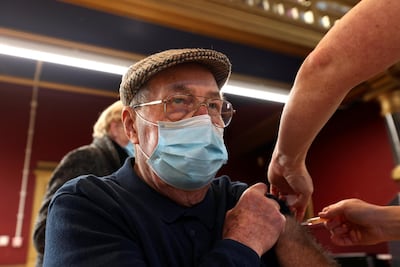The UK could offer coronavirus vaccines to Ireland after the country hit the “crucial milestone” of offering a shot to every care home resident in England.
The achievement came after EU chief Ursula von der Leyen and British Prime Minister Boris Johnson held talks after a chaotic week in which the bloc threatened to restrict exports of Covid-19 vaccines to the rest of the world to ensure Europe got its “fair share”.
Ms von der Leyen said that AstraZeneca - which infuriated the EU by reducing vaccine deliveries to the continent due to production issues in Belgium - would now use both of its UK-based plants for distribution to Europe.
It is hoped AstraZeneca's new delivery schedule of 9 million additional vaccine doses to the EU will help get the bloc’s chaotic inoculation drive back on track.
“We want 70 per of the grownup population to be vaccinated by the end of the summer,” Ms von der Leyen told German broadcaster ZDF.
She added that supplies should increase significantly in the second quarter when Johnson & Johnson and other pharmaceutical companies overcome early hurdles.
In the wake of last week’s standoff, Mr Johnson said on Sunday he wanted Europe and the rest of the world to receive vaccinations “at the same time” as the UK.
Ministers are understood to want to prioritise deliveries of spare vaccines to Ireland as soon as supplies are guaranteed for the UK, The Telegraph reported.
Ireland, which shares a land border with the UK, is regarded by some ministers as “one epidemiological zone”.
“Britain, the UK, we can’t think of this just as a project for us and us alone. We want to make sure as many people across Europe, across the whole world, get access to vaccines,” Mr Johnson said.
Asked if the EU had lost the vaccine race with Britain, Ms von der Leyen said “the only race we are running at the moment is the race against the virus and against time”.
However, some have warned the EU is still acting too slowly to secure vaccines.
David Lawrence, chief financial officer of Valneva, said the EU was yet to place an order with his company. The French firm, which manufacturers its Covid-19 vaccine in Scotland, will supply the UK with 100 million doses over two years.
Warning that some officials may have "their expectations out of sync", Mr Lawrence said the EU should act now to avoid short supplies.
"We have got to book slots with suppliers who are giving us key components or the vaccine. The same will be true of other vaccines," he told BBC's Radio 4 Today programme.
"The supply process isn’t something that can be switched on and switched off over a couple of weeks. It’s a long process."

The UK has now offered a coronavirus vaccine to residents at every eligible care home in England.
NHS England said more than 10,000 care homes with older residents had been offered vaccines, although a small number of homes had visits deferred by local public health directors for safety reasons during local outbreaks.
Mr Johnson described the achievement, expected to be confirmed by official figures on Monday, as a "crucial milestone" in the race to inoculate the population.
A target of February 15 has been set for the UK to vaccinate the top four priority groups: care home residents and carers; all those aged 80 and over and frontline health and social care workers; all those 75 and over; all those aged 70 and over and clinically extremely vulnerable individuals.
On Saturday, a record 598,389 first jabs were given across the UK, with nearly nine million people receiving the first dose of a vaccine.
Prof Mike Tilsley from the University of Warwick, an infectious disease modeller, said the lifting of restrictions would depend on how effective vaccines are at preventing transmission of the virus.
“If the vaccine rollout continues at high levels and we find these vaccines are good at blocking transmission, as well as preventing severe infection, then we’re in a good position,” he told the BBC.
“Hopefully by the summer we can get back to something pretty close to what we saw before the pandemic as normal.”



















